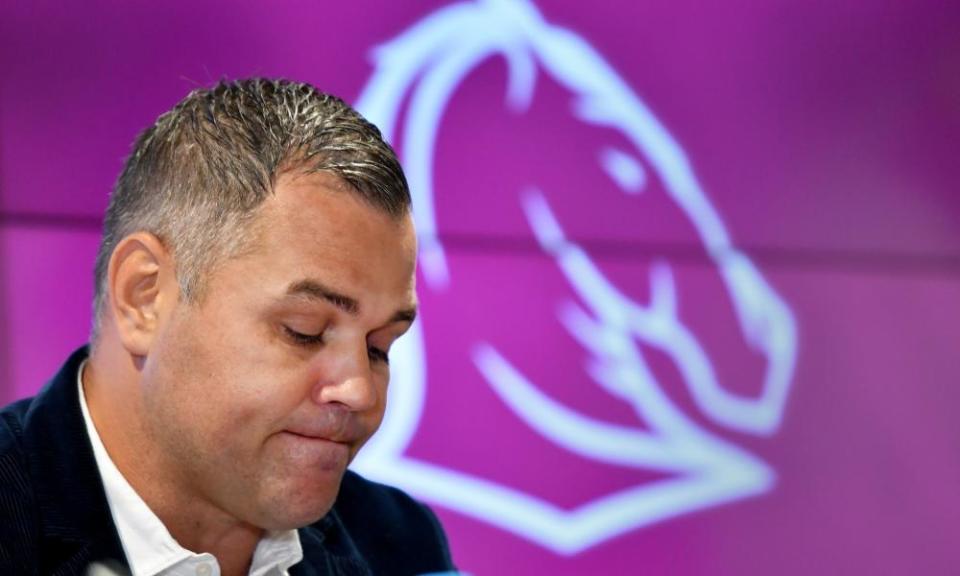Anthony Seibold saga breaks new ground with ferocity of attacks in digital age

Sport in Australia has crossed the Rubicon with the extraordinarily dramatic Anthony Seibold saga. His fall at Brisbane, less than two years into what was essentially a six-year deal, was marked by viciousness and a pointed personal attack not seen before in Australian sport.
Separating truth from hysteria during his tumultuous time at the Broncos is a complicated matter. There is little question though that Seibold’s tenure started on the wrong foot following a public slanging match with outgoing coach Wayne Bennett.
There is no doubt the on-field performances of the Broncos during his time in Brisbane was poor, winning just 14 of 38 games, suffering a 58-0 finals defeat at the hands of Parramatta and enduring their worst season in their 33-year history. Poor recruitment and retention decisions – made by the club and not just Seibold – caused tremendous consternation and frustration amongst a vitriolic fanbase not used to losing.
Related: A hot mess in Brisbane: how the Broncos fell into an NRL nightmare | Maria Recouvreur
The other truth to the entire matter is that no coach in the history of rugby league has been the victim of such a vicious, personal sustained attack. It was unprecedented. The fall of a coach is always a tumultuous time: things are said, blame is apportioned and awkward endings are a given. But the game has not seen such a ferocious onslaught on a participant that cared little for the damage it wreaked beyond his removal from the head coaching position.
“Poor on-field performance leads to fans, sponsors and those across the sport questioning whether Anthony is the right person to lead that team,” Darren Murphy, managing director of Core Integrity, a firm focused on reputation protection, says. “That’s a natural question to be asking but in today’s social media age, and the ability for everyone to have an opinion and share it an uncensored manner, the intensity of those questions, comments and criticisms is far greater than ever before.”
The attacks on Seibold’s reputation certainly crossed a line from what has generally been accepted, even in the age of social media, of trying to force a club’s hand. The NRL has already seen four coaches dismissed prior to Seibold this year. Yet none of Stephen Kearney, Dean Pay, Paul Green or Paul McGregor endured the sustained or personal attacks that Seibold did.
Seibold not only endured an unrelenting pressure from the mainstream media but scandalous and defamatory social media campaigns that were well beyond either football or business. “I say it is cyberbullying,” Murphy says. “The definition of cyberbullying is to use an electronic communication to bully a person by sending messages that intimidate or threaten. And bullying itself is the repeated nature of those actions.”
While Seibold has left his post at the Broncos after reportedly reaching a settlement with the club, he has vowed to pursue those behind the most vile of the attacks on him.
“I think it’s great that Anthony has taken a stand,” Murphy says. “Love him or hate him, you must admire the fact that he has taken matters into his own hands to capture the information, have it investigated and hand it over to police. We all need to be held accountable for our behaviour, and this includes online.”
Accountability has been rare with social media attacks but is becoming more prevalent. Mark Geyer and his daughter are pursuing an attack on them while NRL personality Erin Molan is doing same.
“I’d like to see more people take a stand like this,” Murphy says. “It takes the brave actions of those impacted to speak up and take a stand before we see real change. It will be a tough and long road, but hopefully this is the start of a new chapter for all of us to say enough is enough when it comes to online bullying, trolling and defaming others.”
There is a cost to the pursuit though, Murphy explains. “He is taking a stand, and potentially at great financial and emotional cost to both him and his family.” The long-term impact on his reputation could also cost a person his career, his passion and his way of life.
“Reputation is critical, whether in a professional or personal capacity,” Murphy says. “And often, we are our own worst enemies at protecting our own reputation but in this case, it appears as though Anthony has been unfairly targeted. Time will tell how devastating it has been to Anthony both financially and reputation wise.”
Seibold may have not got the results. He may not have handled the media well. He may not have been able to handle the pressure of such a high-profile job. But he certainly did not deserve the attacks levelled at him.

 Yahoo Sport
Yahoo Sport 





































